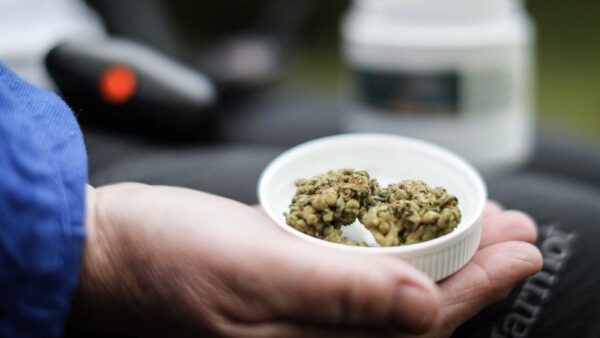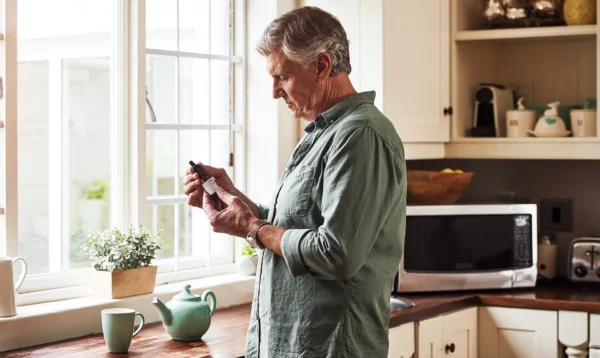Insomnia disorder is a challenging condition that affects approximately one in ten adults globally. It’s more than just a bad night’s sleep; it is linked to negative health outcomes such as anxiety, depression, and reduced quality of life. While commonly prescribed medications can help in the short term, they have limitations, including concerns about dependency and a lack of data supporting their long-term use. This has led to a growing interest in exploring other options, such as medical cannabis.
Current Treatments for Insomnia
The first-line treatment for insomnia disorder is cognitive behavioural therapy for insomnia (CBT-I). However, an absence of clear referral pathways and a shortage of CBT-I providers mean accessibility is often limited for patients here in the UK. Some patients may be prescribed medications. While these drugs may be effective in the short term, evidence for their long-term benefit is limited. Moreover, they are often associated with side effects, such as withdrawal symptoms and dependence.
Medical Cannabis and Insomnia
In recent years, interest in the potential of medical cannabis in people with insomnia has grown. In fact, a clinical review co-authored by clinicians at Curaleaf Clinic which examined the overall evidence on medical cannabis and insomnia was featured last month in our blog. The role of the endocannabinoid system in sleep modulation suggests that endocannabinoid receptors may be an effective target for novel insomnia treatments. Indeed, a growing number of patients are being prescribed medical cannabis for insomnia in the UK and other countries around the world.
The UK Medical Cannabis Registry
The UK Medical Cannabis Registry was established by Curaleaf Clinic in 2019. As the first patient registry of its kind, the registry was designed to gather real-world evidence for the outcomes of people prescribed medical cannabis for a range of conditions, including insomnia.
A recent study, published in the journal PLOS Mental Health, presents a detailed analysis of patients with insomnia from the UK Medical Cannabis Registry. The study followed 124 patients over an 18-month period building on earlier findings from patients prescribed medical cannabis for insomnia.
The Study’s Findings: What the Patients Reported
The study’s findings indicate an association between starting medical cannabis and changes in patients’ reported outcomes. It is important to note that this was a case series, meaning it was an observational study and cannot prove that the medical cannabis directly caused these changes.
Sleep Quality: On the Single-Item Sleep Quality Scale (SQS), patients’ average scores changed from a baseline of 2.66 to 5.67 after just one month. While this magnitude of improvement lessened over time, scores remained statistically significant up to 18 months.
Anxiety: Patients reported a change in anxiety symptoms, with average scores on the Generalised Anxiety Disorder-7 (GAD-7) scale going from 9.59 at baseline to 4.99 at one month. These changes were sustained throughout the 18-month period.
Health-Related Quality of Life: The study also found that patients experienced changes in their health-related quality of life, particularly in the areas of pain/discomfort and anxiety/depression.
Adverse Events: Only 11 of the 124 participants reported adverse events, which were mostly mild to moderate. The most common adverse events were fatigue, insomnia, and dry mouth. No disabling or life-threatening events were reported.
Important Considerations and the Path Forward
This study provides valuable real-world evidence from a long-term patient registry, offering insights that are often difficult to capture in short-term clinical trials. The findings suggest that while medical cannabis may be a potential option for patients with insomnia who have not found success with conventional treatments, there is still much to learn.
The study’s authors, from Curaleaf Clinic, acknowledged that the decreasing magnitude of improvement in some scores over time could be due to patients developing a tolerance to the therapeutic effects of CBMPs. This highlights the importance of continued monitoring and individualised treatment plans.
The authors conclude that while the study demonstrates good tolerability and promising associations with improved patient-reported outcomes, high-quality randomised controlled trials (RCTs) with long-term follow-up are essential to confirm the effectiveness and safety of medical cannabis for primary insomnia.
News Coverage and Expert Commentary
This groundbreaking research was recently covered by various news organisations, including Cannabis Health. The article featured a quote from our very own Dr. Simon Erridge, Research Director at Curaleaf Clinic, who commented on the study’s findings:
“Over an 18-month period, our study showed that treatment for insomnia with cannabis-based medicinal products was associated with sustained improvements in subjective sleep quality and anxiety symptoms. These findings support the potential role of medical cannabis as a medical option where conventional treatments have proven ineffective, though further randomised trials are needed to confirm long-term efficacy.”
He also added:
“Conducting this long-term study provided valuable real-world evidence on patient outcomes that go beyond what we typically see in short-term trials. It was particularly interesting to observe signs of potential tolerance over time, which highlights the importance of continued monitoring and individualised treatment plans.”
This perspective from Dr. Erridge underscores our commitment to advancing the understanding of medical cannabis and ensuring that its use is guided by a strong evidence base.
Disclaimer: This blog post is for informational purposes only and is based on a specific clinical study. It is not medical advice. The efficacy and safety of medical cannabis have not been established. Patients should always consult a qualified healthcare professional before making any decisions about their treatment.








